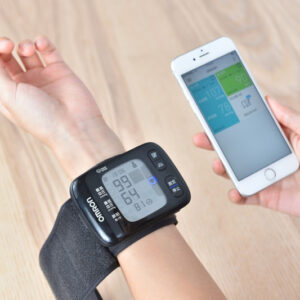High blood pressure or hypertension is a common medical condition that affects millions of people worldwide. It is often called the ‘silent killer’ because it rarely shows any symptoms and can lead to serious health problems, such as heart disease and stroke, if left untreated. Monitoring your blood pressure regularly is essential to managing your condition and staying healthy.

Here’s how to choose the right blood pressure monitor for you.
- Consider the type of monitor: There are two types of blood pressure monitors available in the market- upper-arm monitors and wrist monitors. Upper-arm monitors are considered more accurate and reliable than wrist monitors. They also tend to be more comfortable to use and have larger displays. Wrist monitors are more compact and portable, making them a good option for travel.
- Check for accuracy: Accuracy is paramount when it comes to blood pressure monitoring. Look for devices that have been tested and validated by independent agencies, such as the British Hypertension Society or the Association for the Advancement of Medical Instrumentation. Also, make sure to calibrate your device regularly to ensure that it is always accurate.
- Ease of use: Choose a device that is easy to use and read. It should have large, easy-to-read numbers and simple controls. The cuff should also fit comfortably around your arm or wrist without being too tight or too loose.
- Memory function: A device with a memory function can store multiple readings, making it easier to track changes in your blood pressure over time. Some devices can even sync with your smartphone or computer, allowing you to track your readings digitally.
- Cost: Blood pressure monitors come in a range of prices, from budget-friendly options to high-end models with advanced features. Decide on a budget before you start shopping, and remember that a more expensive device doesn’t necessarily mean better quality.
- Brand reputation: Stick with reputable brands that have a track record of producing high-quality, reliable bp monitors. Look for brands that offer warranties and customer support.
In conclusion, choosing the right blood pressure monitor requires careful consideration of several factors, including accuracy, ease of use, memory function, cost, and brand reputation. By taking these factors into account, you can find a device that meets your needs and helps you manage your blood pressure effectively. Always consult with your healthcare provider before starting to monitor your blood pressure at home.

It’s not necessarily required for every family, but it can be useful to have a blood pressure monitor in the household if anyone in the family has a history of high blood pressure or other cardiovascular problems. Having a sphygmomanometer at home can allow for regular monitoring and early detection of any abnormalities, which can be helpful in managing and preventing potential health issues. It’s always best to consult with a medical professional to determine if using a bp meter is necessary for your particular situation.
People who have a history of high blood pressure, heart disease, or stroke are typically advised to use a blood pressure monitor. Additionally, individuals who have a family history of these conditions or who have other risk factors such as obesity, diabetes, or smoking may also benefit from using a blood pressure monitor. It’s important to note that even if you don’t have any known risk factors, regular monitoring of your blood pressure is still a good idea as high blood pressure often has no symptoms but can lead to serious health complications if left untreated. Ultimately, it’s best to consult with a healthcare professional to determine if using a blood pressure monitor would be beneficial for you based on your individual medical history and risk factors.





